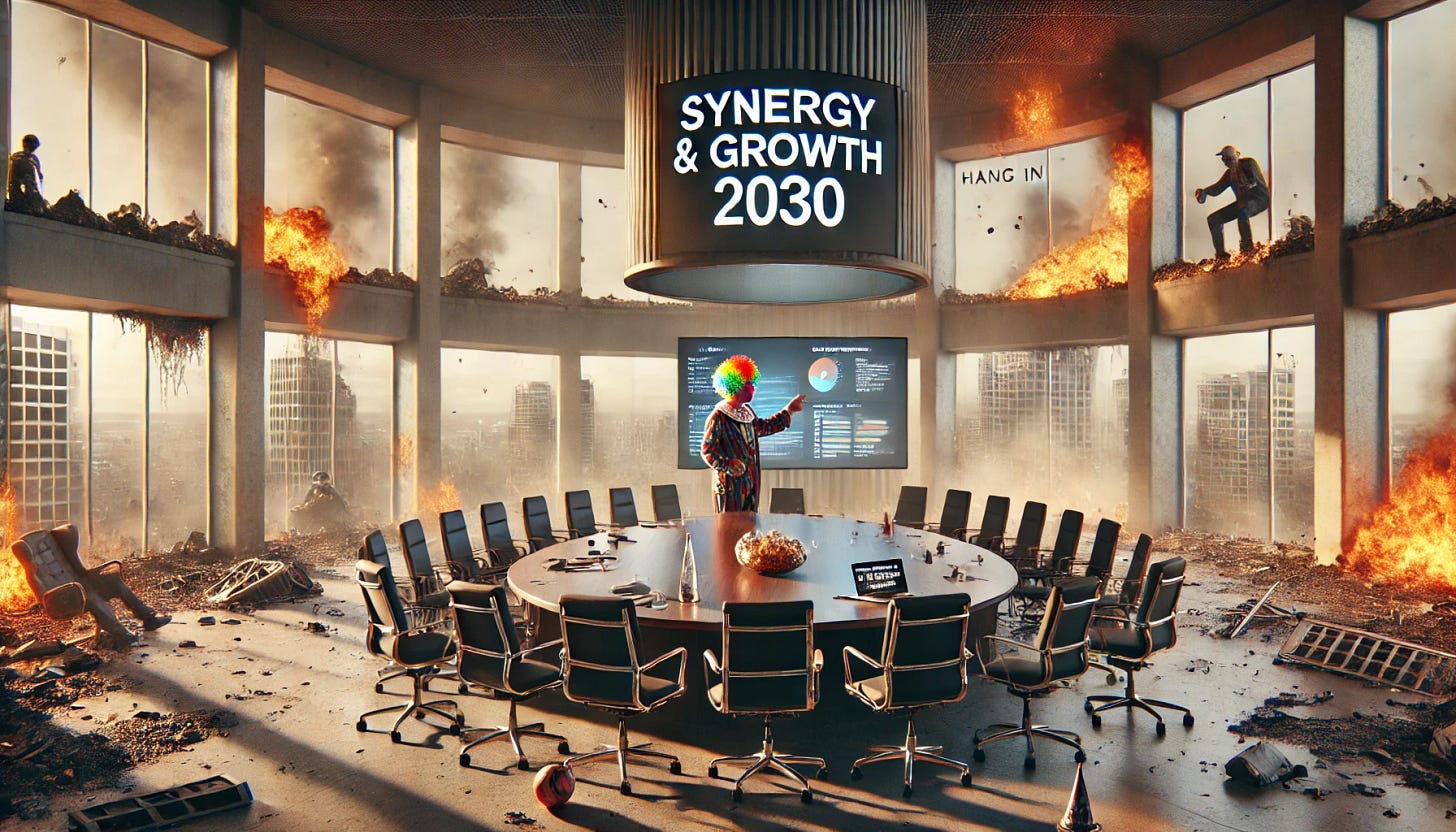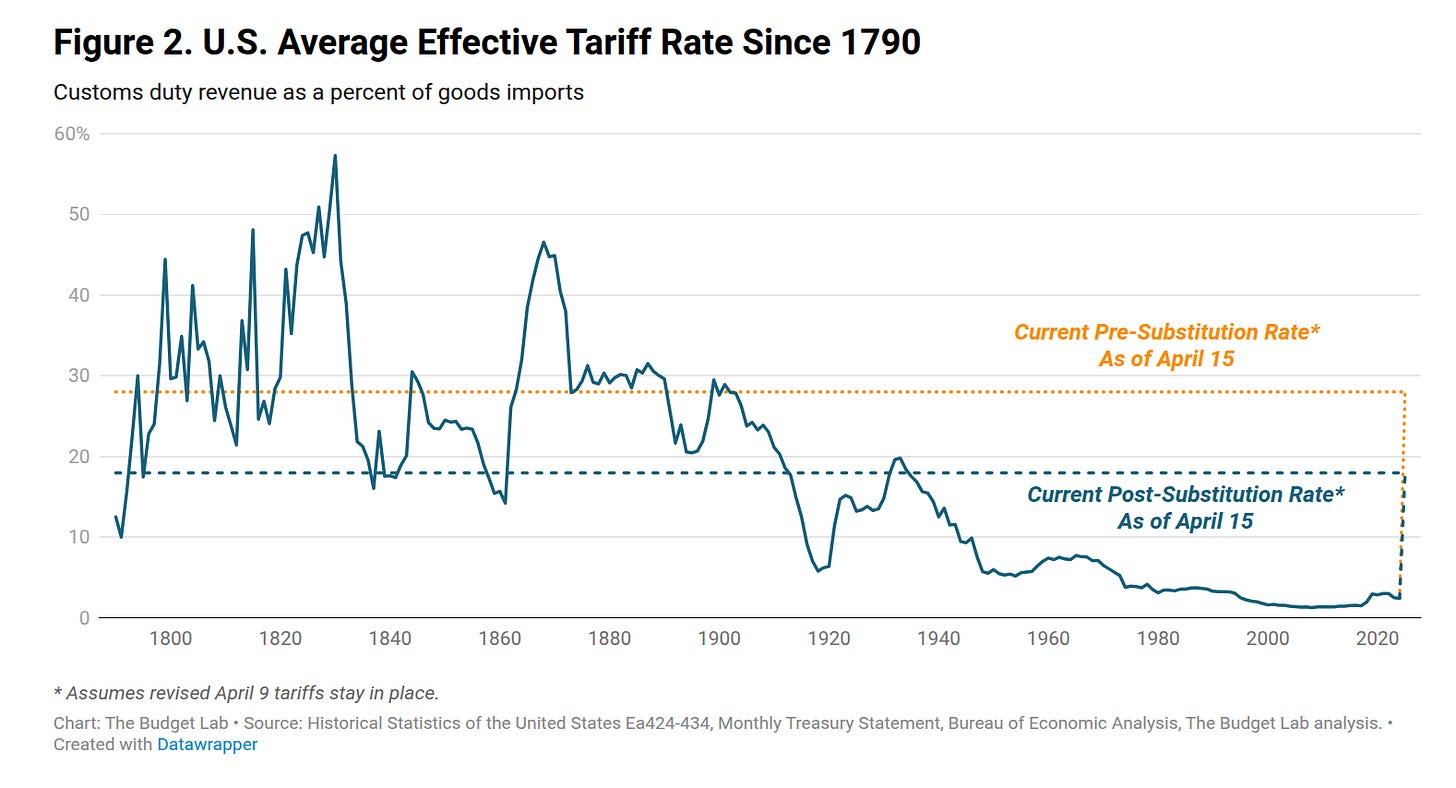This is an AI-assisted article written for The Sloppy Times, a publication dedicated to chronicling the absurd spectacle of 21st-century civilization's undramatic unraveling. Through sardonic commentary and unflinching analysis, we examine the peculiar theater of institutional decay, diminishing standards, and breathtaking mediocrity that characterizes our era—finding dark humor in the realization that rather than ending with a bang or whimper, civilization appears to be collapsing through a series of bureaucratic mix-ups, PowerPoint presentations, and half-assed workarounds. Inspired by
's Sloptraptions, I document the tragicomic machinery of modern decline while it's still operational enough to laugh at.President Donald Trump's 2025 "Liberation Day" tariffs were supposed to save American manufacturing. Instead, they delivered a masterclass in modern institutional incompetence: a mathematically illiterate formula, market panic, and a humiliating backtrack—all while achieving nothing beyond accelerating global economic fragmentation.
The tariff regime's centerpiece was a formula so fundamentally flawed that economists openly called it "idiotic," treating everyday purchases as losses and using elasticity assumptions that were off by a factor of four.
When markets responded with their harshest selloff in 17 years, Trump executed a stunning 90-day "pause" while insisting it was all part of his master plan. Only China remained targeted with a 245% tariff—ensuring mutual economic destruction with America's largest trading partner while solving precisely zero structural problems.
This isn't just an amusing anecdote about one leader's incompetence. It's the concentrated essence of how civilization now operates: systems of breathtaking complexity managed with all the care of a toddler wielding garden shears, creating consequences so disproportionate to their causes that even experts watch in bewilderment.
We've built a world too complex for anyone to understand, yet too interconnected for incompetence to remain contained—a world where, to paraphrase Mike Judge's eerily prophetic "Idiocracy," our institutions water the crops with energy drinks and wonder why nothing grows.
The Machinery of Modern Incompetence
We've constructed a global civilization of such byzantine interconnection—an MC Escher plumbing diagram of interdependencies—that no single human could possibly grasp even a fraction of how it actually works.
The result? A new and perverse form of danger: not the methodical evil of history's monsters, but the casual incompetence of mediocre minds with access to civilization-altering mechanisms they fundamentally don't understand.
Moloch's Buffet: Sacrificing the Long-Term for Short-Term Comfort
And here's the soul-crushing reality: we're not victims of this incompetence—we're its eager co-conspirators. We get exactly the leaders, systems, and catastrophes we deserve through our spectacular blend of apathy, laziness, and willingness to accept increasingly shoddy standards in exchange for momentary convenience.
In his essay "Meditations on Moloch," Scott Alexander describes the ancient god Moloch as the embodiment of systems that force us to sacrifice what we truly value to compete. We've created a civilization-wide Moloch—a system where we sacrifice long-term stability for immediate gratification:
We watch democracy crumble while binge-watching Netflix.
We witness climate collapse while debating delivery app options.
We observe the dismantling of civil liberties while arguing about celebrity gossip.
We scroll past news of global famine to rate potato chip flavors.
We've developed a civilization-killing attention deficit disorder and outsourced our collective rage to Twitter bot farms.
The most terrifying part isn't that civilization is collapsing—it's that we're barely looking up from our phones to notice. Nero at least played the fiddle while Rome burned; we're just checking if the video of Rome burning got enough likes.
Every system we've built has grown too complex to fail properly—instead, they fail spectacularly, incompetently, and in ways no one can predict.
The Age of Theatrical Authoritarianism
Time was when dictators knew their fucking business. Stalin's apparatus disappeared millions with bureaucratic precision that would make today's tech companies envious. Mao's Great Leap Forward managed to reshape an entire civilization and kill tens of millions with meticulous planning and unwavering commitment. Hitler built a genocidal machine so efficient it required industrial engineering. They were monsters of historic proportion—but monsters who understood the machinery of power and wielded it with horrifying competence.
Today's strongmen? They're performing authoritarianism rather than practicing it. They issue threatening tweets instead of manifestos, stage "coups" that look like confused tour groups, and back down the moment the stock market hiccups. It's not karaoke authoritarianism—that would imply they're at least following a script. This is theatrical autocracy: all costume, no substance; all bluster, no follow-through; all dramatic poses without the capacity to direct the play.
It's like watching a community theater production of Macbeth where everyone forgot their lines and the daggers are made of foam.
The Revolving Door of Permanent Bureaucracy
Take Italy, where 68 governments have cycled through power in 76 years, some lasting mere months, yet somehow maintaining exactly the same dysfunctional bureaucracy regardless of who holds office. It's not just that the system is broken—it's that it's perfectly designed to perpetuate itself while being immune to any attempt at meaningful reform. The bureaucracy remains eternal while elected officials simply pass through like tourists.
The Environmental Arsonist Approach
Or look at Brazil under Bolsonaro, who managed the perverse achievement of actively dismantling environmental protection agencies even as satellite imagery showed the Amazon burning at unprecedented rates. When faced with irrefutable evidence, his administration's response was essentially: "What forest fires? Those are just cooking fires. Very large cooking fires. For cooking very large meals." His environmental minister was caught on tape discussing how to use the pandemic as a distraction to "run the cattle herd" through the Amazon, destroying environmental protections while the world wasn't looking.
This isn't just garden-variety corruption—it's Too-Complex-to-Fail corruption. These regimes built labyrinths of patronage so convoluted that when actual crises arrived, the systems collapsed under their own bureaucratic weight. The perfect encapsulation of our era: sophisticated enough to concentrate power, too sloppy to use it effectively, and brazen enough to call it victory.
But incompetent authoritarians represent only half the disease afflicting our institutions. The true danger emerges when these bumbling strongmen find common cause with equally mediocre oligarchs—creating a perfect storm of power without competence and wealth without responsibility.
The Unholy Marriage of Half-Assed Politics and Bumbling Oligarchy
The truly spectacular achievement of our era is the unholy fusion of incompetent politicians with half-assed oligarchs—neither group capable of accomplishing their basic functions, yet together managing to weaponize mediocrity to unprecedented levels.
Consider the spectacular convergence of idiocy in our supposed leaders. In January 2025, U.S. President Donald Trump launched his own meme coin—$TRUMP—just days before his second inauguration, sending it soaring to a $14.5 billion market cap while his family retained 80% of the tokens. The sitting head of state was essentially running a digital Ponzi scheme while governing the world's largest economy—like discovering your airline pilot is simultaneously running a pyramid scheme from the cockpit during your flight.
Not to be outdone, Argentina's President Javier Milei followed Trump's lead in February, promoting a cryptocurrency called $LIBRA on his official social media, claiming it would help finance small businesses. The token's price skyrocketed to over $4 billion in market capitalization within hours—before collapsing as blockchain analysts discovered wallets associated with the token's creators withdrawing $99 million in a classic "rug pull" scam. Milei's response? Delete the tweet and pretend it never happened.
Today's tech oligarchs embody a particularly dangerous form of incompetence—the Dunning-Kruger billionaire who believes success in creating addictive apps somehow qualifies them to solve society's most complex problems. They can't keep basic hate speech off their platforms but pontificate confidently about "fixing education" or "solving climate change" through magical technological solutions that never quite materialize.
The true perversity is their blind faith in techno-solutionism—the belief that every human problem, from political polarization to income inequality, can be solved with the right algorithm or enough computing power. These are people who mistake "disruption" for improvement and "optimization" for wisdom. They fail to understand that their fortunes came not from genius but from being in the right place at the right time with the right venture capital connections—yet they lecture the rest of us about meritocracy while their workers rely on food stamps.
At least the robber barons of old had the decency to be straightforward villains. Carnegie might have been a union-busting tyrant, but he actually built something. Today's billionaires want to plunder society while being worshipped as visionaries, dismantle democracy while being thanked as innovators, and avoid taxes while being applauded as philanthropists. They're not captains of industry; they're cosplayers with unusual access to capital.
This new breed of oligarch-politician represents the perfect synthesis of our collective failure—their shared incompetence creating a perpetual motion machine of system-wide collapse. They've mastered the art of extracting maximum private benefit from public infrastructure while contributing nothing toward its maintenance.
The result is a spectacular form of financial nihilism where everything becomes a meme—stock markets, currencies, even the concept of value itself.
The YOLO Economy: Kofinas's Financial Nihilism in Action
Remember the GameStop mania of 2021? When retail investors pumped a failing video game retailer's stock to absurd heights simply because "it was funny"” That wasn't an aberration; it was a preview of our financial future—a system where value is whatever the crowd momentarily decides it is, where economic reality is optional, and where the concept of long-term investment seems as quaint and outdated as rotary phones.
We've entered the era of what Demetri Kofinas calls "financial nihilism"—"price discovery in a world where nothing matters." Traditional value investing assumes you can identify an underlying value that exists independent of price. But in our new reality, that connection has been severed. As Kofinas explains, what's "incredibly nihilistic" is that people aren't investing because they think something has value—they're investing "because they believe that the narrative about it is convincing enough that other people will also feel that it's convincing enough that the thing will go up."
It's not just "YOLO economics" (You Only Live Once); it's a complete unmooring of markets from any reference to underlying reality. This nihilism transforms our economy from one that creates value to one that merely extracts and redistributes it—a zero-sum game where claims on wealth accumulate to smaller and smaller portions of the network while the system itself produces less and less of actual value.
In this nihilistic financial landscape, the only strategy is gambling on whatever seems amusing at the moment. Companies with no profits and skeletal business models reach multi-billion-dollar valuations, while entire currencies emerge based on dog memes. Nothing needs to work; it just needs to attract attention long enough for early investors to cash out.
Dismantling Safeguards, Shocked by the Results
And the government's response to this casino capitalism? In 2023, as Silicon Valley Bank imploded from basic risk management failures, the federal government simply changed the rules overnight.
What's particularly damning is that this collapse was enabled by the 2018 rollback of Dodd-Frank regulations that had specifically exempted mid-sized banks like SVB from stress tests that would have caught these exact vulnerabilities. First, they dismantled the safeguards, then acted shocked when the predictable disaster occurred, then pretended uninsured deposits were suddenly insured.
The financial equivalent of removing all the guardrails from a cliff road, watching cars plummet, then declaring "Actually, gravity doesn't apply today."
Moloch's Corporate Corner Office
This is the defining feature of our moment: corporations too busy maximizing quarterly profits to notice they're sawing off the branch they're sitting on, paired with governments too captured by corporate interests to remember why regulations existed in the first place.
It's precisely what Scott Alexander described in his Moloch essay—the inevitable race to the bottom when systems reward short-term optimization at the expense of long-term survival. Companies sacrifice safety for profit, regulators sacrifice oversight for political favor, and everyone acts surprised when the predictable catastrophe occurs.
It's a symbiotic relationship of staggering incompetence—corporations lobby for deregulation then act surprised when their unregulated products fail catastrophically; governments defund oversight agencies then express shock when disasters occur.
And we, the public? We're busy arguing about which fictional characters should be recast in movie reboots as Rome quite literally burns around us. We've abandoned any notion of collective identity or shared fate in favor of hyperindividualism—each of us rationally pursuing our own narrow self-interest while collectively marching toward catastrophe, like Moloch devouring our better angels for short-term gain.
Institutional Decay: When Systems Fail to Even Fail Properly
Our institutions have become masters of failing with flair, then failing to learn from those failures, creating meta-failures of such recursive incompetence they almost achieve a kind of perverse brilliance.
The COVID-19 pandemic offers perhaps the most spectacular global display of institutional incompetence in modern history. Despite decades of pandemic preparation plans, billions in funding, and countless tabletop exercises, the world's premier health organizations and wealthiest nations stumbled through a masterclass in how not to handle a crisis.
The WHO delayed declaring an emergency while praising China's transparency. Nations hoarded medical supplies from each other while preaching global solidarity. Public health systems built over decades collapsed within weeks. And different countries implemented wildly contradictory policies based more on political expedience than epidemiological evidence.
Even more telling was the global vaccination campaign—wealthy nations bought up supplies while lecturing poorer countries about global cooperation. When vaccines finally reached developing nations, they often arrived near expiration with no logistical support. Meanwhile, anti-vax conspiracies flourished across social media platforms whose algorithms were literally designed to amplify emotional, divisive content—platforms that made billions in profit while society paid the cost in lives and social cohesion.
Or examine the 2008 financial crisis, where the combination of deregulation fervor, financial "innovation," and willful blindness created the conditions for global economic collapse. The U.S. Congress repealed Glass-Steagall protections, regulators looked the other way while banks packaged toxic mortgages into securities so complex that not even their creators fully understood them, and rating agencies slapped AAA ratings on financial instruments that were essentially gambling chips. When it all collapsed, the same institutions that created the mess were entrusted with the cleanup, ensuring the cycle would repeat.
This pattern plays out across every domain. Take the plastic crisis—we've created a material that lasts virtually forever, used it primarily for products designed to be thrown away after minutes of use, and have no viable plan for dealing with the consequences despite decades of awareness. Every minute, we dump a garbage truck's worth of plastic into the oceans, yet our response has been to create "awareness campaigns" about plastic straws while the petrochemical industry ramps up plastic production to unprecedented levels.
These aren't failures of malice—they're failures of systems designed with such labyrinthine complexity that accountability becomes impossible. Nobody is responsible because everybody is responsible, a perfect dispersion of blame that ensures problems are identified only after they've become catastrophes. And we the people? We scroll past the headlines about these failures to get to the sports scores and celebrity gossip. We've earned this incompetence through our own staggering indifference.
Our current institutional failures aren't without precedent. Throughout history, societies have collapsed not because they were conquered but because they grew too complex to manage effectively—offering us warnings that we've systematically ignored.
Historical Parallels: Sleepwalking into Catastrophe
History offers unsettling parallels to our current predicament. In July 1914, Europe's supposedly sophisticated diplomatic corps sleepwalked into World War I through a cascade of miscalculations, rigid bureaucratic procedures, and telecommunications delays. Each power acted according to what seemed like rational self-interest within their limited perspective, yet collectively they produced an outcome that none desired and all failed to prevent. As historian Christopher Clark described it, Europe's leaders were "sleepwalkers, watchful but unseeing, haunted by dreams, yet blind to the reality of the horror they were about to bring into the world."
Similarly, the collapse of complex societies throughout history often followed the same pattern we're witnessing today. Anthropologist Joseph Tainter documented how civilizations from Rome to the Maya experienced "declining marginal returns on complexity"—essentially, their administrative systems grew so convoluted that they eventually consumed more resources than they produced benefits. The result? Institutional calcification, diminishing problem-solving capacity, and eventually, collapse.
Today, as we face multiple overlapping crises—climate change, biodiversity loss, polarization, institutional decay—our responses follow this same pattern of declining returns on complexity. We build elaborate governance frameworks that produce magnificent reports and pitiful action. We create regulatory regimes so complex that they become impossible to enforce efficiently. We design financial instruments so intricate that not even their creators understand their systemic risks.
The difference is that unlike Rome or the Maya, our collapse would be global—there is no "outside" to our interconnected civilization from which a new order might emerge.
The Italian philosopher Antonio Gramsci famously wrote, "The old world is dying, and the new world struggles to be born; now is the time of monsters." If he were writing today, he might update it: "The competent world is dying, and the functional world struggles to be born; now is the time of sloppiness."
We're living through a morbid interregnum where the old systems of expertise and accountability are collapsing, but their replacements are half-baked, glitchy, and held together with the digital equivalent of duct tape and safety pins.
Nowhere is this pattern of complexity-induced paralysis more evident—or potentially more catastrophic—than in our response to climate change, where the gap between scientific understanding and institutional action has grown into an existential abyss.
Climate Denial: The Collaborative Art of Planetary Suicide
Perhaps nowhere is our collective sloppiness more evident—or more existentially catastrophic—than in our response to climate change. We've managed to turn a straightforward physics problem into a political football, with results so absurd they'd be gut-bustingly hilarious if they weren't actively pushing us toward civilization collapse.
The Conference Carousel of Meaningless Pledges
Consider the spectacular institutional failure that is our global climate response: thirty fucking years of international summits, tear-jerking speeches, solemn pledges, and non-binding agreements while carbon emissions continue their relentless climb to civilization-ending heights.
It's not that we don't know what to do—the roadmaps for decarbonization exist in mind-numbing detail. It's that actually doing it requires effort, coordination, and willingness to change that exceeds our collective attention span. We're treating the literal end of human civilization like a particularly boring Netflix series we keep meaning to finish someday but can never quite muster the enthusiasm to complete.
At COP28, the annual climate conference held in checks notes the United Arab Emirates (an oil state!), world leaders arrived in private jets to announce billions in climate financing that mostly never materializes while simultaneously approving trillions in new fossil fuel projects. The conference itself was chaired by Sultan Al Jaber, CEO of Abu Dhabi National Oil Company (ADNOC).
You couldn't write satire this damning—reality has rendered satirists obsolete.
Moloch's Climate Sacrifice: Individual Rationality, Collective Suicide
We've created a society where individual rationality produces collective suicide—the purest expression of Moloch in action. The mathematician William Forster Lloyd identified this paradox nearly 200 years ago in his analysis of the "tragedy of the commons"—where individual herders, acting rationally to maximize their own gain, collectively destroy the shared pasture they all depend on.
We've scaled this dynamic to planetary proportions. Each person makes supposedly "rational" economic decisions:
Driving instead of taking public transit
Flying instead of videoconferencing
Ordering next-day delivery instead of waiting
Eating imported foods instead of local
All these choices maximize personal convenience. But when eight billion people make those same "rational" choices, we get catastrophic collective outcomes.
It's as if we've designed the perfect machine for converting short-term individual benefit into long-term collective disaster—a global apparatus for transforming momentary comfort into civilizational collapse. This isn't just tragedy of the commons—it's tragedy of the cosmos, since we're the only known intelligent life, and we're busy proving we're not actually that intelligent.
The Hypocrisy Machine
We rage against corporate greed while holding index funds filled with the same companies we purport to despise. We demand climate action from politicians whose campaigns we refuse to support. We express shock at extreme weather while doing absolutely nothing to change our consumption patterns. It's not just hypocrisy—it's a complete system failure of both markets and governance.
The most damning part? Unlike other existential threats, we're doing this with full knowledge and in slow motion. Nuclear war might happen in minutes through miscalculation; climate collapse is happening over decades through deliberate inaction.
We're watching the meteorite approach in ultra-slow motion, calculating its precise impact point, measuring its civilization-ending diameter, and then choosing to argue about whether meteorites are real while scrolling TikTok.
This isn't just a failure of policy—it's the Sistine Chapel of incompetence, with governments, corporations, and citizens all contributing their own uniquely spectacular brushstrokes to the masterpiece of planetary suicide.
A Modest Proposal: Global Reverse-Meritocracy Declaration
After careful study of our species' impressive commitment to incompetence, I humbly propose we stop pretending and officially declare a Global Reverse-Meritocracy—enshrining our true operating principle that the least qualified person should always hold the most consequential position.
We'll establish a Department of Deliberate Incompetence where nuclear launch codes will be distributed exclusively to people who regularly lock themselves out of their own email accounts. Supreme Court nominations will require candidates to demonstrate they've never read the Constitution but "have some pretty strong feelings about it." The Federal Reserve will be run exclusively by people who've bankrupted at least three casinos—establishments literally designed to mathematically guarantee profit.
Emergency response systems must be redesigned to include a minimum 72-hour waiting period for all disasters to ensure maximum ineffectiveness. Climate policy will be determined by a random selection of oil executives who genuinely believe dinosaurs and humans coexisted 6,000 years ago.
To streamline our economic collapse, financial regulators will be required to have significant investments in whatever industry they oversee, and their performance bonuses will be tied to how effectively they dismantle consumer protections. Any regulatory body found actually preventing harm will be immediately restructured until properly dysfunctional.
For climate policy specifically, we'll hold annual conferences where leaders fly private jets to luxury resorts to issue stern warnings about carbon emissions before returning home to approve fossil fuel expansion. These conferences must produce agreements so toothless they make strongly-worded letters seem aggressive by comparison.
In education, we'll continue replacing practical knowledge with administrative bloat, ensuring graduates possess immaculate sensitivity to microaggressions while remaining utterly incapable of detecting macroscams like multilevel marketing or cryptocurrency "investments."
Sound absurd? Less absurd than what we're already doing—designing systems so complex that nobody understands them, putting the least qualified people in charge, actively ignoring catastrophic failures, and then expressing shock when everything collapses. Our proposal merely acknowledges what we're already practicing: a civilization-wide commitment to elevating mediocrity while punishing competence.
Too Inept for Proper Dystopia: Welcome to Idiocracy
Mike Judge's 2006 film "Idiocracy" imagined a future where humanity had devolved into drooling morons watering crops with energy drinks after 500 years of evolutionary decline through anti-intellectual culture and dysgenic breeding.
The film depicts a world where:
Costco has grown to the size of a city
The most popular TV show is called "Ow! My Balls!"
The top-grossing movie is simply titled "Ass"
Brawndo ("The Thirst Mutilator") has replaced water for all purposes—including crop irrigation—because it "has electrolytes"
The president is a former porn star and professional wrestler who communicates primarily through grunts and catchphrases
It was meant as absurdist satire with a comfortably distant timeline. Instead, it's starting to look like an optimistic documentary. We've managed to achieve Idiocracy-level dysfunction in just 20 years rather than the projected 500, and with the crucial difference that our idiots have access to nuclear weapons, algorithmic financial trading, and artificial intelligence.
Not to mention that at least in Idiocracy, they eventually recognized the smartest person and put him in charge—we're still promoting the dumbest among us while actively mocking expertise.
Too Sloppy for Orwell, Too Disorganized for Huxley
The darkly comical truth is that we're too sloppy even for a proper dystopia. Orwell's 1984 featured a totalitarian state competent enough to actually control its population. Our surveillance states can't even keep their own data secure.
Huxley's Brave New World had a coherent system of social control; our social media platforms accidentally radicalize grandmothers through recommendation algorithms nobody fully understands.
The Great Adult Abdication
Perhaps the most telling sign of our decline into Idiocracy is how we've engineered an entire culture of permanent adolescence. The serious business of maintaining civilization—the boring, unglamorous work of maintaining infrastructure, enforcing standards, and planning for the future—has been replaced with an obsession with comfort and entertainment.
Universities now compete for students with luxury amenities rather than academic rigor
Corporate offices resemble playgrounds with meditation pods and foosball tables while the actual work gets outsourced to contractors with no benefits
We've created an economy where the most valued companies produce nothing tangible but instead optimize algorithms to maximize our dopamine hits per hour
This isn't just aesthetic preference—it's a systematic abandonment of adult responsibility. When society celebrates and rewards perpetual adolescence, who's left to do the serious, often tedious maintenance work that civilization requires?
Moloch's Entertainment Complex
This abandonment of responsibility is yet another manifestation of Moloch—the system that incentivizes us to sacrifice what truly matters for what feels good now. We've built an entire economy that rewards constant distraction and punishes the tedious-but-essential maintenance of civilizational infrastructure.
The result is a culture where even our apocalypses are stupid. We're not going to die in a blaze of glory or through some elegant villainous scheme—we're going to perish because the boring tasks of maintenance and planning made us all go "meh, someone else will handle it."
Like the characters in Charlie Brooker's Black Mirror, we've created a world where technology designed to connect us has instead turned us into dopamine addicts perpetually distracted by artificial emergencies while ignoring genuine catastrophes. Our devices constantly ping us about celebrity feuds while quietly collecting data to better manipulate our future choices. It's not the technology that betrayed us—it's our willing surrender to shallow digital comfort over meaningful engagement.
The real danger isn't some coordinated descent into tyranny. It's death by a thousand system errors, a civilization gradually rendered uninhabitable not through evil but through accumulated incompetence—a global game of telephone where the starting message was "maintain basic services" and the final garbled outcome is "sorry, everything is inexplicably broken, have you tried restarting the planet?"
We Get the Incompetence We Deserve
Which brings us back to Trump's 2025 "Liberation Day" tariffs. The most telling part of this saga isn't the mathematical illiteracy of the formula, nor the hasty "90-day pause" after markets plummeted, nor the fact that only $500 million was generated in tariffs—it's what's happening right now.
Despite actively destabilizing the global trading system through both incompetence and deliberate hostility, Trump faces virtually no political consequences. The rest of us watch as decades of economic integration are dismantled by someone who doesn't understand basic elasticity calculations.
Media coverage treats this existential threat to global commerce as just another drama in the never-ending political reality show. We've normalized a level of economic incompetence that previous generations would have found utterly disqualifying—not because it isn't serious, but because our capacity for outrage has been exhausted by the relentless parade of absurdities.
The problem isn't just the damage being done; it's our collective shoulder shrug in response.
Moloch's Final Victory Lap
This indifference is the ultimate triumph of Moloch—the system that rewards shortsightedness has finally rendered us incapable of even recognizing catastrophe when it unfolds before our eyes. We've sacrificed our capacity for outrage on the altar of convenience, surrendered our agency to the gods of distraction.
History teaches us that great civilizations rarely fall to barbarian hordes at the height of their power. They collapse under their own administrative weight when their systems become too complex to operate effectively and too opaque to reform meaningfully.
They don't die screaming in glorious battle—they die in committee meetings where critical maintenance budgets get reallocated to executive bonuses while everyone checks their phones.
The Sloppypocalypse
We're not facing the end of the world through malice. We're facing something potentially worse: the end of a functional world through sheer, unrelenting sloppiness. And unlike evil, which at least knows what it's doing, incompetence won't even notice when it wins.
It will just wonder why:
The lights won't turn on
The tap water looks funny
The emergency broadcast system keeps playing advertisements instead of evacuation orders
Then it will form a committee to study the problem, schedule a follow-up meeting in six months, and carry on as if everything is fine.
Meanwhile, the rest of us will keep scrolling, keep complaining, keep contributing to the very problems we bemoan, secure in the knowledge that we're too dumb to cause the end of the world properly—we'll just half-ass our way into oblivion, one incompetent decision at a time.
Turns out Mike Judge was an optimist. It didn't take 500 years to reach Idiocracy—just 20. And unlike his fictional future, we don't even have the sense to put the smartest person in charge when we find them.
About This Article's Creation: A Metanarrative
This article was developed through an extended AI collaboration process using Claude. The creation started with a concept for "The Sloppy Times," a satirical publication focused on institutional decline and lowered standards. The initial prompt explored the idea that modern society is characterized more by incompetence than malice—that we're "too dumb to cause the end of the world" properly.
Through multiple iterations, the article evolved from this initial concept, incorporating feedback on structure, examples, and tone. Key development stages included:
Establishing the core theme of "Too Complex to Fail" as the organizing principle
Adding global examples beyond America-centric references
Incorporating historical parallels from complex society collapse
Developing the "Theatrical Authoritarianism" metaphor
Adding the financial nihilism concept (drawing on Demetri Kofinas's work)
Creating the "YOLO economics" section and its connection to broader societal trends
Strengthening the climate change section with more specific examples
Creating the Swiftian "Modest Proposal" section
Expanding the Idiocracy reference and infantilization of adults theme
Refining the conclusion to circle back to Trump's tariffs
The article's voice was deliberately calibrated to maintain a sardonic, cynical tone that balances sharp criticism with dark humor, as specified in the publication guidelines. The development process involved multiple rounds of revision focusing on making examples more globally relevant, metaphors more original, and critiques more intellectually substantive.









